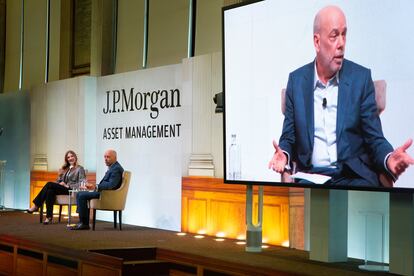Everyone wants to ride the wave of ETFs, the trending product on Wall Street
JP Morgan Asset Management aims to reach a market share of $1 trillion in exchange-traded funds, which currently manage savings valued at $12 trillion

The first exchange-traded fund (ETF) was launched in 1990. However, this passively managed product (it normally replicates stock market indexes) with low fees and the liquidity of a stock, and which can be bought and sold in real time unlike conventional funds with end-of-day net asset value, did not begin to take off commercially until the first decade of the 21st century. And when it did, the growth was spectacular. Currently, these vehicles manage savings valued at $12 trillion, and the forecast is that in 2027 the assets under management will reach $20 trillion.
In this growing business, JP Morgan Asset Management wants to play a greater role. The American bank manager started relatively late in the sale of ETFs — it launched its platform in 2014 — and now has 113 exchange-traded funds, with assets of $164 billion. “Our goal is that within five years this figure will reach one trillion dollars,” explained George Gatch, CEO of JP Morgan Asset Management, last week during an annual media event held in London and to which EL PAÍS was invited.
JP Morgan Asset Management’s main way to grow in this market is, above all, through the so-called actively managed ETFs. These products have the same liquidity and pricing characteristics of regular ETFs, but they do not simply replicate the behavior of a stock market index. Instead, managers have some leeway to move the portfolio and, if they get it right, achieve extra profitability. “Our approach to risk is about helping clients navigate turbulent times. And we do that focused on active management. Uncertainty generated inefficiencies in many markets and that means opportunities for good managers,” Gatch explained. “Actively managed ETFs are now only 6% of the exchange-traded fund market, but they represent a revolution in this industry due to their cost, transparency, efficiency and flexibility.”
Sustainability
Gatch also highlighted the sector’s commitment to technology. “It is the biggest challenge facing the industry. We already have 150 engineers. It will allow us to reduce costs and provide greater added value to customers,” he said. Along with ETFs, another one of the American asset manager’s major lines of growth is in alternative products. “Unlisted assets offer diversification in clients’ portfolios,” Gatch said.
Karen Ward, Chief Market Strategist for Europe, the Middle East and Africa at JP Morgan Asset Management, also participated in the event and sent an optimistic message about the global situation. “The economy is doing better than managers could have thought two years ago,” she underscored. In her opinion, inflation, although it is moderating, will be the key variable around which the behavior of the markets will pivot in the coming months. “Real wages are rising for the first time in a long time. That’s good news for consumption. Furthermore, fiscal policy should work in favor of economic growth. Governments are making great public spending efforts to finance the energy and digital transition.”
Regarding monetary policy, Ward believes that Western central banks will begin to lower rates starting next summer. “But they will remain higher than before Covid. If you think about it, that would be a good sign because it would mean that the global economy has enough strength to grow far from zero rates.”
Sign up for our weekly newsletter to get more English-language news coverage from EL PAÍS USA Edition
Tu suscripción se está usando en otro dispositivo
¿Quieres añadir otro usuario a tu suscripción?
Si continúas leyendo en este dispositivo, no se podrá leer en el otro.
FlechaTu suscripción se está usando en otro dispositivo y solo puedes acceder a EL PAÍS desde un dispositivo a la vez.
Si quieres compartir tu cuenta, cambia tu suscripción a la modalidad Premium, así podrás añadir otro usuario. Cada uno accederá con su propia cuenta de email, lo que os permitirá personalizar vuestra experiencia en EL PAÍS.
¿Tienes una suscripción de empresa? Accede aquí para contratar más cuentas.
En el caso de no saber quién está usando tu cuenta, te recomendamos cambiar tu contraseña aquí.
Si decides continuar compartiendo tu cuenta, este mensaje se mostrará en tu dispositivo y en el de la otra persona que está usando tu cuenta de forma indefinida, afectando a tu experiencia de lectura. Puedes consultar aquí los términos y condiciones de la suscripción digital.









































